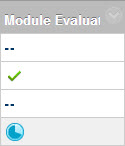It is always good to start the New Year at the Durham Blackboard Conference. It’s a conference organised by users not Blackboard. The particular users are the Learning Technologies Team (LTT) based at Durham, in particular Julie Mulvey and Malcolm Murray. The conference has two great features: it is a great conference and it is inexpensive to attend — what’s not to like!
Before the Conference proper starts there is an afternoon of workshops and Dr Stephen Vickers and I gave a workshop on ‘LTI in Action’. LTI stands for Learning Tools Interoperability. The LTI specification defines a standardised way for Virtual Learning Environments (e.g. Succeed) to link to external tools (e.g. Turnitin or Resource Lists — because Turnitin’s implementation is very new we don’t currently use LTI to link to Turnitin at Stirling although we will at some future point; the same applies to Resource Lists). More details on the workshop can be found on the ceLTIc project blog:
http://www.celtic-project.org/Project_blog#/entries/248954006
Including a picture of the ceLTIc M&M dispensing machine! Stephen and I have worked together for a number of years on the LTI specification, including two JISC funded projects: ceLTIc (creating environments for Learning using Tightly Integrated components) and ceLTIc II. For details see the project’s web site:
http://www.celtic-project.org/
This year’s theme was students as partners, giving the wonderful conference logo:

Following the theme, presenters were encouraged to co-present with the students participating in the local partnership activities, and may did.
The conference opens with Malcolm’s welcome which was as amusing as ever and is great way to get things going. Next was the first of the keynotes: Engagement through Partnership given by Dr Abbi Flint from the HEA. The simplest way to summarise Abbi’s talk are the HEA documents (the 2nd of which Abbi co-authored):
Framework for partnership in learning and teaching in higher education
Engagement through partnership: students as partners in learning and teaching in higher education
In the user presentations at the conference, Scotland was well represented with presentations from Glasgow Caledonian University (x3 — well down Jim/Fraser!) and Edinburgh University. I didn’t catch all the GCU presentations but the first was an example from their Engage initiative. This was a presentation with a student from the MSc International Fashion Marketing. The student talked about how Engage had worked on the MSc programme and the changes that students were proposing to the design of the curriculum; Jim outlined the goals of the programme.
The Edinburgh presentation was on using Open Badges to recognise students engagement with course representatives activities at Edinburgh. Again a co-presentation with a student, in this case it was the student who had drawn up the framework for engagement that the badges were designed to reward. As this has just started at Edinburgh there is not yet any data on how many students have put in the effort to earn the badges but I’ll be following the outcomes with interest and will very probably ask for Edinburgh to update us via a future Scot-BUG presentation.
Thus ended the first day of the conference and in the evening a special treat is in store and that’s dinner in the Great Hall (requires QuickTime) at Durham Castle — it’s an amazing place to sit and eat your dinner! For those of us staying at the Castle, it is an equally amazing place to have your breakfast — especially on the Monday when there were two of us staying! Staying in the Castle also means it is a short walk from the dinner back to your room….
The second day opened with Dr Alan Masson, Blackboard, giving the 2nd keynote Students as Partners – Blackboard’s Perspective. What was noticeable from Alan’s talk was how many of his examples from Blackboard were of activities that we are already doing at Stirling: My Learning (a space in Succeed where learning materials can be found across a range of topics) and from Bristol a space for Course Representatives which eLD is working on at the moment with the students’ union. We also have the sign-up for course representatives managed via Blackboard.
Next was the traditional Blackboard Road Map presentation and the biggest news from this is that Blackboard are working on a responsive interface to Blackboard (aka Succeed). This means that Succeed will work nicely on Phones and Tablets re-configuring the interface to work sensibly on each device. This is a big project as re-building the interface is a major undertaking but one that needs doing as the current interface is getting a little long in the tooth and more importantly does not take advantage of many modern UI innovations. A demonstrator for the new interface should be available around April to allow anyone to play with but don’t expect the new interface in production at Stirling until August 2016 at the earliest. Which you may regard is good or bad news!
The final keynote was Doug Belshaw from Mozilla (Mozilla is most famous as the organisation behind the Firefox browser but also supports Open Badges – Doug worked on Open Badges). Doug spoke on Radical Participation and challenged the audience at one point to draw our architecture of participation! There isn’t a great deal of point in explaining what Radical Participation means when we have access to the Mark Surman’s blog posting that inspired Doug. It’s well worth reading:
https://commonspace.wordpress.com/2014/12/18/davidgoliathempire/
Doug’s slide are available on slideshare.
Pretty much the remainder of the day was taken up with vendor presentations. I was especially interested in Aspire’s as they were talking about their LTI implementation for their Reading List product. It looked very nice and I’m looking forward to experimenting with it in the near future.
Simon Booth
